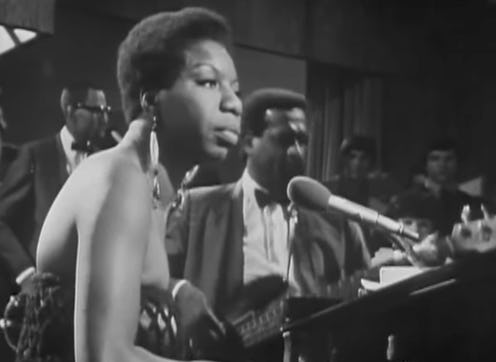Entertainment
These Are The 2 Badass Women Of Color Included In 2018's Rock & Roll Hall Of Fame
In past years the Rock & Roll Hall of Fame has had a reputation for not giving women musicians their due, particularly women of color, but next year will apparently be different. On Wednesday, it was announced that Nina Simone and Sister Rosetta Tharpe will be inducted into the Rock & Roll Hall of Fame's Class of 2018. This decision to honor the legacy of these women is a good step in the right direction for Rock Hall's diversity problem, and, considering these two women's magnificent legacies, is long overdue.
Back in 2016, many people criticized Rock Hall for inducting five all-male groups in that year's class, including inductee Steve Miller. During his acceptance speech at the ceremony, the musician called out the very people honoring him, saying, "I encourage you to keep expanding your vision, to be more inclusive to women and more transparent to the public.”
Despite this call to action, the next year wasn't much better. While 2017 saw the much-deserved inclusion of folk singer Joan Baez, artists like Janet Jackson and Chaka Khan — who were both nominated that year for a second time — were ultimately not voted in. Some fans felt that Rock Hall's voting body might have overlooked Jackson and Khan's many accomplishments because of their gender, the color of their skin, or both.
Which brings us to this year, when two women of color first-time nominees (who have been eligible for decades, but more on that later) have been officially voted in as inductees.
According to the Rock & Roll Hall of Fame's official induction process, 25 years must have passed since the artist's first commercial recording for them to be considered. The artist must also demonstrate "unquestionable musical excellence and talent" and must have "had a significant impact on the development, evolution and preservation of rock & roll." By those rules, Nina Simone — the artist who has been named am influential figure by everyone from Kanye West and John Legend to Alicia Keys and has been covered by dozens of other musicians — has been eligible since 1983.
Simone, known as "The High Priestess of Soul," was a multi-talented musician, a masterful pianist with a one-of-a-kind voice. Her inclusion in Rock Hall now, after 2017, seems particularly fitting given the country's political climate. Simone, who died in 2001, was not only a black performer, but an artist who proudly sang about her experience as an African-American woman. Her songs like "Mississippi Goddam," "Four Women," and "To Be Young, Gifted and Black" offered vivid snap shots of black life during the Civil Rights-era in the 1960s.
Her defiance in the face of racism can seem inspirational today for people facing adversity. Her friend, the activist Nikki Giovanni, told The Root back in 2015, "If Nina were here, she'd have her Black Lives Matter [T-shirt] on."
Meanwhile, the inclusion of Sister Rosetta Tharpe is meaningful in regards to rock history. Tharpe, who is being inducted as an "Early Influence," paved the way for the entire genres of rock & roll and R&B with her gospel music, which she sang accompanied by her electric guitar starting in the late 1930s. She went on to play large arenas, and her music, according to Rock Hall, influenced the likes of Elvis Presley, Little Richard, and Johnny Cash — three musicians, who, in turn, inspired many of the artists who came after them.
Considering Tharpe has been eligible for inclusion in the Hall of Fame since 1963, and is known by many as "the Godmother of rock 'n' roll," it might seem surprising that she is only being inducted now. However, Rock Hall, and music publications, have a history of often overlooking the contributions of black artists to the formation of rock, which combined the blues, gospel, and other musical influences.
Hopefully the Rock & Roll Hall of Fame induction class of 2018 is only the start of a new trend. In future years, it would be great to see more women bestowed the honor, including the aforementioned Janet Jackson and Chaka Khan, as well as Lauryn Hill, Whitney Houston, Missy Elliott, and many other deserving artists and hitmakers of color.
